考研同义词替换
- 格式:doc
- 大小:120.00 KB
- 文档页数:12

《现代汉语》北大版讲义笔记第六章修辞1."说曹操,曹操到。
”这个句子使用的修辞手法是:2014A拈连B双关C比喻D借代2."无言独上西楼,月如钩。
寂寞梧桐深院锁清秋。
〃这两句此举中用到了一和一修辞手法。
——20133.修辞上从语言运用的角度来研究语言的,不是语言的要素,因而跟语音、词汇、语法无关。
(判断2013)4.语体的差别主要表现在语体风格上,在用词上没有什么差异。
(判断2013)5.〃墙上芦苇,头重脚轻根底浅;山间竹笋,嘴尖皮厚腹中空〃中,运用了的修辞手法。
20126.借喻,是指不说出本体,而是借用喻体直接代替本体。
(判断2012)7."日去渐已远,衣袋渐已缓〃中,运用了的修辞手法。
20118.下面哪个句子的修辞手法属于比拟?A小家碧玉B时雨点红桃千树C星星不如汗珠明D江山如此多娇20119."生命之树常青”这句话运用了比喻,这种比喻属于暗喻。
(10判断)10.〃张辉回答不出问题,急得两眼直冒绿光。
〃词类修辞手法使用恰当。
(10判断)第一节修辞概说本节关键词:修辞:是什么、为什么、怎么样修辞三原则:准确性、得体性、艺术性一、什么是修辞1关关雎鸠,在河之洲。
窈窕淑女,君子好逑。
2母亲没有灰心,她对穷苦人民的同情和对为富不仁者的反感却更强烈了。
3没有拿来的,人不能自成为新人;没有拿来的,文艺不能自成为新文艺。
4生如春花般烂漫,死似秋叶般静美。
5酒后的愁思,愈抽愈长。
I —1>a —f(-)准确性语言形式准确传达内容,包括思想感情、意图评价等。
(二)得体性语言形式切合特定语境、现实的交际环境。
(≡)艺术性语言表达趣味性。
语言准确得体的基础上,选择最适合的表达形式,对语言进行艺术加工和创造。
第二节语音调节和利用本节关键词:音节搭配叠音、儿化声调平仄段落诗节一、什么是语音修辞语音形式是否顺口悦耳、是否优美动听,必然会一定程度上影响语言表达效果。
语音修辞,是对话语的声音的修饰和调整。
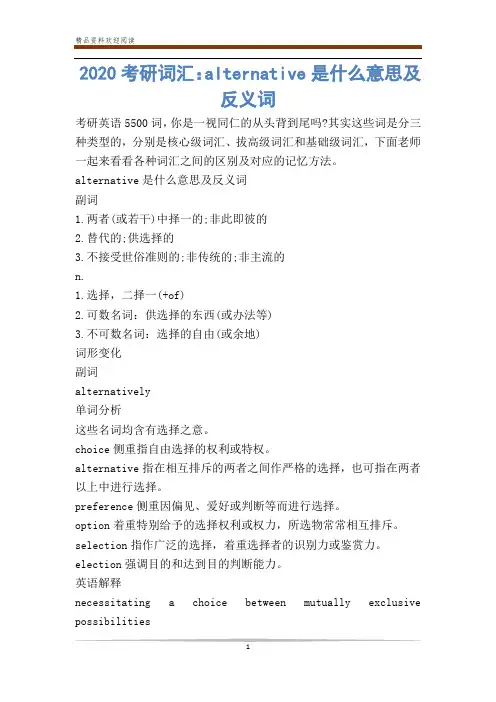
2020考研词汇:alternative是什么意思及反义词考研英语5500词,你是一视同仁的从头背到尾吗?其实这些词是分三种类型的,分别是核心级词汇、拔高级词汇和基础级词汇,下面老师一起来看看各种词汇之间的区别及对应的记忆方法。
alternative是什么意思及反义词副词1.两者(或若干)中择一的;非此即彼的2.替代的;供选择的3.不接受世俗准则的;非传统的;非主流的n.1.选择,二择一(+of)2.可数名词:供选择的东西(或办法等)3.不可数名词:选择的自由(或余地)词形变化副词alternatively单词分析这些名词均含有选择之意。
choice侧重指自由选择的权利或特权。
alternative指在相互排斥的两者之间作严格的选择,也可指在两者以上中进行选择。
preference侧重因偏见、爱好或判断等而进行选择。
option着重特别给予的选择权利或权力,所选物常常相互排斥。
selection指作广泛的选择,着重选择者的识别力或鉴赏力。
election强调目的和达到目的判断能力。
英语解释necessitating a choice between mutually exclusive possibilitiesallowing a choiceone of a number of things from which only one can be chosen pertaining to unconventional choices例句The second step, sometimes called search, in the process is to identify alternatives.第二个步骤有时称作寻找,在此过程中是确认各种选择方案。
If you want to reach Boston in time for the meeting, you must go by air; there is no alternative.如果你想按时到波斯顿参加会议,只能坐飞机去,别无选择。
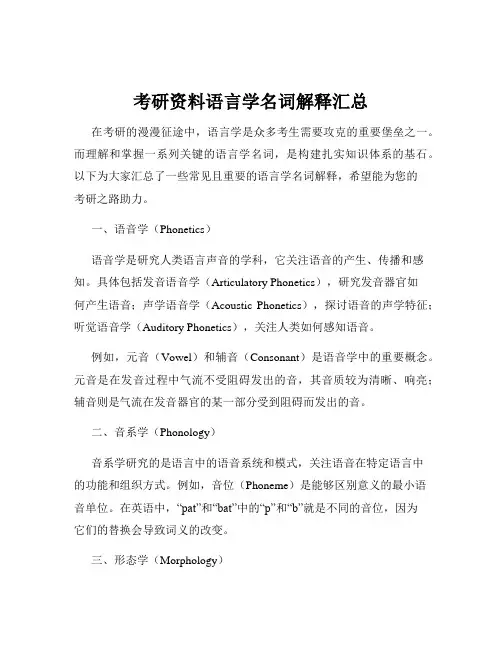
考研资料语言学名词解释汇总在考研的漫漫征途中,语言学是众多考生需要攻克的重要堡垒之一。
而理解和掌握一系列关键的语言学名词,是构建扎实知识体系的基石。
以下为大家汇总了一些常见且重要的语言学名词解释,希望能为您的考研之路助力。
一、语音学(Phonetics)语音学是研究人类语言声音的学科,它关注语音的产生、传播和感知。
具体包括发音语音学(Articulatory Phonetics),研究发音器官如何产生语音;声学语音学(Acoustic Phonetics),探讨语音的声学特征;听觉语音学(Auditory Phonetics),关注人类如何感知语音。
例如,元音(Vowel)和辅音(Consonant)是语音学中的重要概念。
元音是在发音过程中气流不受阻碍发出的音,其音质较为清晰、响亮;辅音则是气流在发音器官的某一部分受到阻碍而发出的音。
二、音系学(Phonology)音系学研究的是语言中的语音系统和模式,关注语音在特定语言中的功能和组织方式。
例如,音位(Phoneme)是能够区别意义的最小语音单位。
在英语中,“pat”和“bat”中的“p”和“b”就是不同的音位,因为它们的替换会导致词义的改变。
三、形态学(Morphology)形态学主要研究词的内部结构和构词规则。
比如,词根(Root)是词的基本部分,承载着主要的词汇意义。
例如,“happy”中的“hap”就是词根。
词缀(Affix)则是加在词根上以改变词义或词性的部分,分为前缀(Prefix)和后缀(Suffix)。
像“unhappy”中的“un”就是前缀。
四、句法学(Syntax)句法学关注句子的结构和组成规则。
比如,句子成分包括主语(Subject)、谓语(Predicate)、宾语(Object)等。
主语通常是句子中表示动作的执行者或主体;谓语则是表达主语的动作或状态;宾语是动作的对象。
五、语义学(Semantics)语义学研究语言符号(词、短语、句子等)与它们所指称的对象之间的关系,即语言的意义。
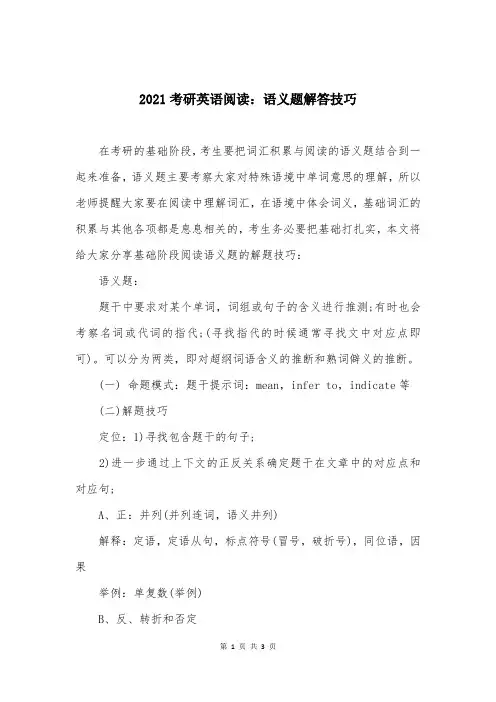
2021考研英语阅读:语义题解答技巧在考研的基础阶段,考生要把词汇积累与阅读的语义题结合到一起来准备,语义题主要考察大家对特殊语境中单词意思的理解,所以老师提醒大家要在阅读中理解词汇,在语境中体会词义,基础词汇的积累与其他各项都是息息相关的,考生务必要把基础打扎实,本文将给大家分享基础阶段阅读语义题的解题技巧:语义题:题干中要求对某个单词,词组或句子的含义进行推测;有时也会考察名词或代词的指代;(寻找指代的时候通常寻找文中对应点即可)。
可以分为两类,即对超纲词语含义的推断和熟词僻义的推断。
(一) 命题模式:题干提示词:mean,infer to,indicate等(二)解题技巧定位:1)寻找包含题干的句子;2)进一步通过上下文的正反关系确定题干在文章中的对应点和对应句;A、正:并列(并列连词,语义并列)解释:定语,定语从句,标点符号(冒号,破折号),同位语,因果举例:单复数(举例)B、反、转折和否定注意:在原文中寻找到对应词以后,有时需要进一步确认对应词的语境含义(在选项中出现和原文主题相关的选项时)替换:可以是原词重现,也可以是同意替换。
排除:替换和排除同时进行。
例如:26. The phrase “reneging on”(Line 3.para.1) is closest in meaning to( )2021text2 [A] condemning. [B] reaffirming. [C] dishonoring. [D] securing. A deal is a deal-except, apparently ,when Entergy is involved. The company, a major energy supplier in New England, provoked justified outrage in Vermont last week when it announced it was reneging on a longstanding commitment to abide by the strict nuclear regulations.解析:段中第二句的意思是:当公司宣布他们对遵守核规则的承诺进行....行动时,理所当然引起了Vermont的愤怒。
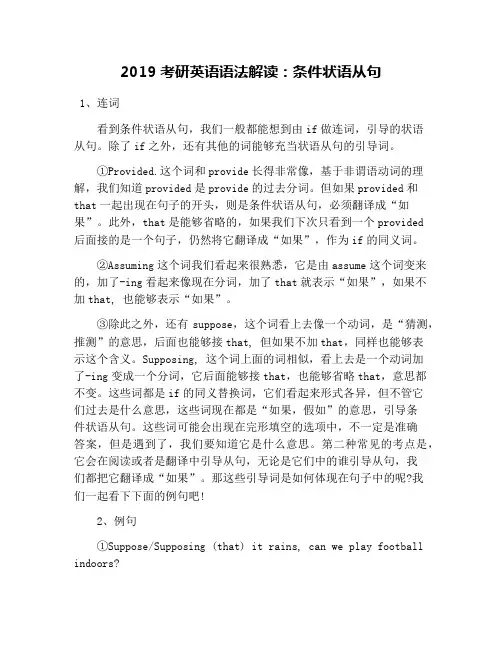
2019考研英语语法解读:条件状语从句1、连词看到条件状语从句,我们一般都能想到由if做连词,引导的状语从句。
除了if之外,还有其他的词能够充当状语从句的引导词。
①Provided.这个词和provide长得非常像,基于非谓语动词的理解,我们知道provided是provide的过去分词。
但如果provided和that一起出现在句子的开头,则是条件状语从句,必须翻译成“如果”。
此外,that是能够省略的,如果我们下次只看到一个provided后面接的是一个句子,仍然将它翻译成“如果”,作为if的同义词。
②Assuming这个词我们看起来很熟悉,它是由assume这个词变来的,加了-ing看起来像现在分词,加了that就表示“如果”,如果不加that, 也能够表示“如果”。
③除此之外,还有suppose,这个词看上去像一个动词,是“猜测,推测”的意思,后面也能够接that, 但如果不加that,同样也能够表示这个含义。
Supposing, 这个词上面的词相似,看上去是一个动词加了-ing变成一个分词,它后面能够接that,也能够省略that,意思都不变。
这些词都是if的同义替换词,它们看起来形式各异,但不管它们过去是什么意思,这些词现在都是“如果,假如”的意思,引导条件状语从句。
这些词可能会出现在完形填空的选项中,不一定是准确答案,但是遇到了,我们要知道它是什么意思。
第二种常见的考点是,它会在阅读或者是翻译中引导从句,无论是它们中的谁引导从句,我们都把它翻译成“如果”。
那这些引导词是如何体现在句子中的呢?我们一起看下下面的例句吧!2、例句①Suppose/Supposing (that) it rains, can we play football indoors?在这句话中,Suppose/Supposing是if的同义替换词,加不加that都一样。
这句话相当于If it rains, can we play football indoors?表示“如果天气下雨,我们能踢足球吗?”②Farmers will have a good harvest, assuming the weatheris favorable. 在这句话中,Assuming也等于if,表示“如果”。
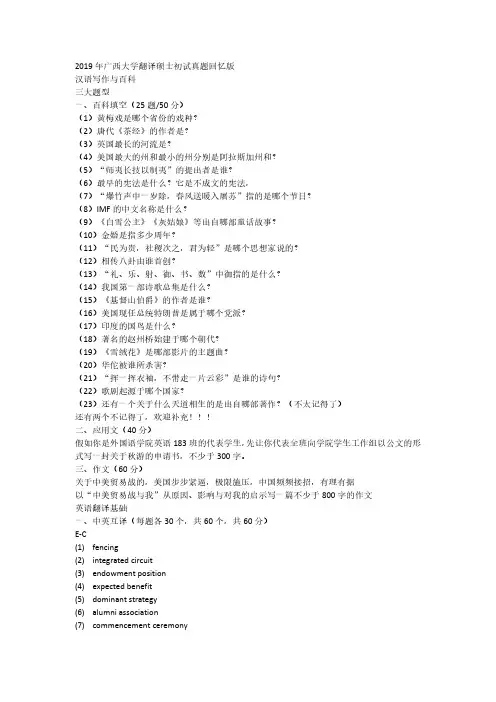
2019年广西大学翻译硕士初试真题回忆版汉语写作与百科三大题型一、百科填空(25题/50分)(1)黄梅戏是哪个省份的戏种?(2)唐代《茶经》的作者是?(3)英国最长的河流是?(4)美国最大的州和最小的州分别是阿拉斯加州和?(5)“师夷长技以制夷”的提出者是谁?(6)最早的宪法是什么?它是不成文的宪法,(7)“爆竹声中一岁除,春风送暖入屠苏”指的是哪个节日?(8)IMF的中文名称是什么?(9)《白雪公主》《灰姑娘》等出自哪部童话故事?(10)金婚是指多少周年?(11)“民为贵,社稷次之,君为轻”是哪个思想家说的?(12)相传八卦由谁首创?(13)“礼、乐、射、御、书、数”中御指的是什么?(14)我国第一部诗歌总集是什么?(15)《基督山伯爵》的作者是谁?(16)美国现任总统特朗普是属于哪个党派?(17)印度的国鸟是什么?(18)著名的赵州桥始建于哪个朝代?(19)《雪绒花》是哪部影片的主题曲?(20)华佗被谁所杀害?(21)“挥一挥衣袖,不带走一片云彩”是谁的诗句?(22)歌剧起源于哪个国家?(23)还有一个关于什么天道相生的是出自哪部著作?(不太记得了)还有两个不记得了,欢迎补充!!!二、应用文(40分)假如你是外国语学院英语183班的代表学生,先让你代表全班向学院学生工作组以公文的形式写一封关于秋游的申请书,不少于300字。
三、作文(60分)关于中美贸易战的,美国步步紧逼,极限施压,中国频频接招,有理有据以“中美贸易战与我”从原因、影响与对我的启示写一篇不少于800字的作文英语翻译基础一、中英互译(每题各30个,共60个,共60分)E-C(1)fencing(2)integrated circuit(3)endowment position(4)expected benefit(5)dominant strategy(6)alumni association(7)commencement ceremony(8)Al Mater(9)Kyoto agreement(10)equestrian sport(11)artificial intelligence(12)central processing unit(13)procedural language(14)operating instruction(15)squash(16)archery(17)volcanic topography(18)Pentagon(19)Star spangled banner(20)acid midst(21)fossil fuel(22)car exhaust(23)spiked crown(24)land subsidence(25)Empire State Building(26)comparative advantage(27)figure swimming还有三个想不起来了,欢迎补充!!!C-E(1)虚假信息(2)“一带一路”空间信息走廊(3)中国国际进口博览会(4)国际货币基金组织(5)贸易顺差(6)联合国政府间气候变化专门委员会(7)网络囤积(8)电动汽车(9)反全球化(10)电子竞技(11)欧元区(12)新兴市场(13)零碳技术(14)实名制(15)偷拍(16)生物技术(17)集装箱港口码头(18)精密传感器(19)正当防卫(20)主流政党(21)自助出境通关(22)古装剧(23)开源软件(24)国内需求(25)还有一个什么世界杯还有好多个想不起来啦,欢迎补充!!!二、篇章翻译(1)E-C(我在网上找到了原文)(2)C-E(来自国务院总理李克强出席第19次东盟与中日韩(10+3)领导人会议的讲话,有所删减修改)当前,世界经济复苏艰难曲折,国际金融市场动荡不稳,全球贸易持续低迷,保护主义明显抬头,经济全球化阻力上升;国际安全形势不容乐观,局部冲突和地区热点问题交织,恐怖主义、难民危机等非传统安全威胁凸显,成为国际社会共同面临的挑战。
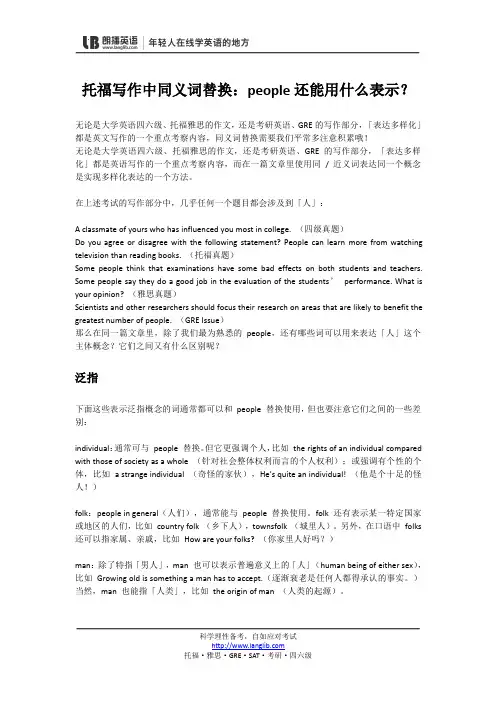
托福写作中同义词替换:people还能用什么表示?无论是大学英语四六级、托福雅思的作文,还是考研英语、GRE的写作部分,「表达多样化」都是英文写作的一个重点考察内容,同义词替换需要我们平常多注意积累哦!无论是大学英语四六级、托福雅思的作文,还是考研英语、GRE的写作部分,「表达多样化」都是英语写作的一个重点考察内容,而在一篇文章里使用同/近义词表达同一个概念是实现多样化表达的一个方法。
在上述考试的写作部分中,几乎任何一个题目都会涉及到「人」:A classmate of yours who has influenced you most in college.(四级真题)Do you agree or disagree with the following statement?People can learn more from watching television than reading books.(托福真题)Some people think that examinations have some bad effects on both students and teachers. Some people say they do a good job in the evaluation of the students’performance.What is your opinion?(雅思真题)Scientists and other researchers should focus their research on areas that are likely to benefit the greatest number of people.(GRE Issue)那么在同一篇文章里,除了我们最为熟悉的people,还有哪些词可以用来表达「人」这个主体概念?它们之间又有什么区别呢?泛指下面这些表示泛指概念的词通常都可以和people替换使用,但也要注意它们之间的一些差别:individual:通常可与people替换。
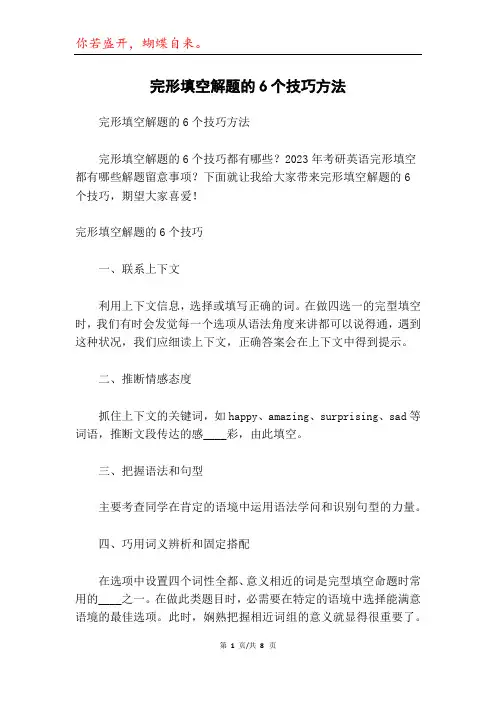
完形填空解题的6个技巧方法完形填空解题的6个技巧方法完形填空解题的6个技巧都有哪些?2023年考研英语完形填空都有哪些解题留意事项?下面就让我给大家带来完形填空解题的6个技巧,期望大家喜爱!完形填空解题的6个技巧一、联系上下文利用上下文信息,选择或填写正确的词。
在做四选一的完型填空时,我们有时会发觉每一个选项从语法角度来讲都可以说得通,遇到这种状况,我们应细读上下文,正确答案会在上下文中得到提示。
二、推断情感态度抓住上下文的关键词,如happy、amazing、surprising、sad等词语,推断文段传达的感____彩,由此填空。
三、把握语法和句型主要考查同学在肯定的语境中运用语法学问和识别句型的力量。
四、巧用词义辨析和固定搭配在选项中设置四个词性全都、意义相近的词是完型填空命题时常用的____之一。
在做此类题目时,必需要在特定的语境中选择能满意语境的最佳选项。
此时,娴熟把握相近词组的意义就显得很重要了。
五、理清规律关系利用规律关系是完型填空命题设计过程中用得较多的方法之一。
解这类题目时需要我们多留意四周生活常识、行文的脉络及句子之间的转承关系。
六、审核答案,复原语篇结束对一篇完形填空的初读和初选后,我们也渐渐加深了对语篇的全面理解,此时需要把已选答案复原代入语篇,进一步验证自己所选答案。
随着语篇还原的比例逐步增大,个别疑难题目的障碍就会去除,这时候就有助于我们进一步查漏补缺。
温馨小提示一、前后呼应法做完形填空题时,要始终抓住文章本身,联系“双语境”来推断,即大语境——全文中心和基调,小语境——空格前后句子所构成的语境;再依据前有伏笔,后有呼应的思路来做题。
二、but转折法完形填空题,but一词后通常会设题。
文中一消失but,应当立刻想到前后语意有转折。
只要知道其中一方的语意,就可以反向推出另一方的意思。
所以大家在做题时,遇到类似but的词(如:however,nonetheless, whereas, yet等)也同样处理,以便于从文中找到解题的依据。
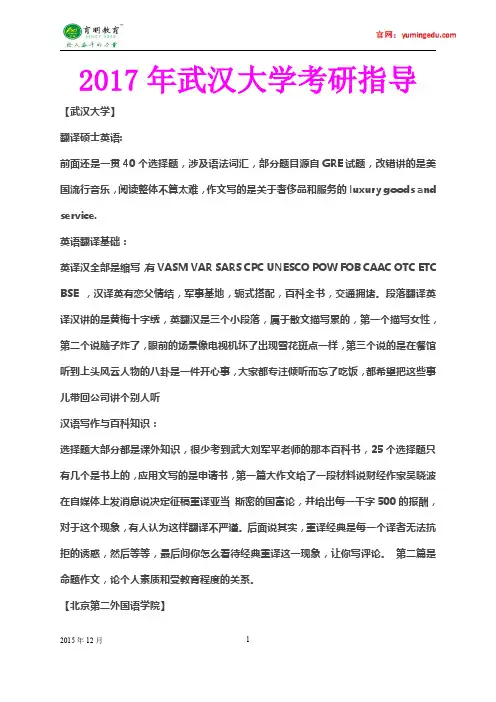
2017年武汉大学考研指导【武汉大学】翻译硕士英语:前面还是一贯40个选择题,涉及语法词汇,部分题目源自GRE试题,改错讲的是美国流行音乐,阅读整体不算太难,作文写的是关于奢侈品和服务的luxury goods and service.英语翻译基础:英译汉全部是缩写,有VASM VAR SARS CPC UNESCO POW FOB CAAC OTC ETC BSE,汉译英有恋父情结,军事基地,轭式搭配,百科全书,交通拥堵。
段落翻译英译汉讲的是黄梅十字绣,英翻汉是三个小段落,属于散文描写累的,第一个描写女性,第二个说脑子炸了,眼前的场景像电视机坏了出现雪花斑点一样,第三个说的是在餐馆听到上头风云人物的八卦是一件开心事,大家都专注倾听而忘了吃饭,都希望把这些事儿带回公司讲个别人听汉语写作与百科知识:选择题大部分都是课外知识,很少考到武大刘军平老师的那本百科书,25个选择题只有几个是书上的,应用文写的是申请书,第一篇大作文给了一段材料说财经作家吴晓波在自媒体上发消息说决定征稿重译亚当斯密的国富论,并给出每一千字500的报酬,对于这个现象,有人认为这样翻译不严谨。
后面说其实,重译经典是每一个译者无法抗拒的诱惑,然后等等,最后问你怎么看待经典重译这一现象,让你写评论。
第二篇是命题作文,论个人素质和受教育程度的关系。
【北京第二外国语学院】汉译英:日本茶道豆腐渣工程国家外汇管理局教育部世界反法西斯战争人民解放军世界文化遗产知识产权英译汉:NASA A fool"s hesitation is no speed A close mouth catches no flies strip the citizenship百科:多瑙河注入哪个海四书人有多少对染色体青铜是铜和()的合金选出不是百科全书作家的外国作家【河海大学】一.填空(2*25,记不清顺序了,但是保证第一个顺序是正确的)1.桃园三结义有刘备,关羽和()2.人生自古谁无死,留取丹心照汗青出自文天祥的哪首诗?二.3.凿壁偷光是谁凿的?三. 4.陆上丝绸之路第一个提出的是谁?大概意思就这样,原句不记得了5.横眉冷对千夫指,俯首甘为孺子牛出自鲁迅的哪首诗?6.桂林山水号称?7.莫奈的《印象日出》是什么派的?8.中国第一条铁路是谁修建的?9.南京享有什么的美誉,自从范蠡在那建城10.获得诺贝尔医学奖的中国人名?11.中国第一部兵法是什么?12.《霸王别姬》原著是谁?13.会当凌绝顶下一句是什么?14.千里共婵娟的婵娟在古时指的是什么?15.诗圣是谁?16.希腊神话中,众神之父是谁?17.泰姬陵是哪里的?18.京剧的四个角色,生旦净and?19.黄梅戏出自哪里?二、小作文写一篇河海大学100周年校庆(不少于400字)。
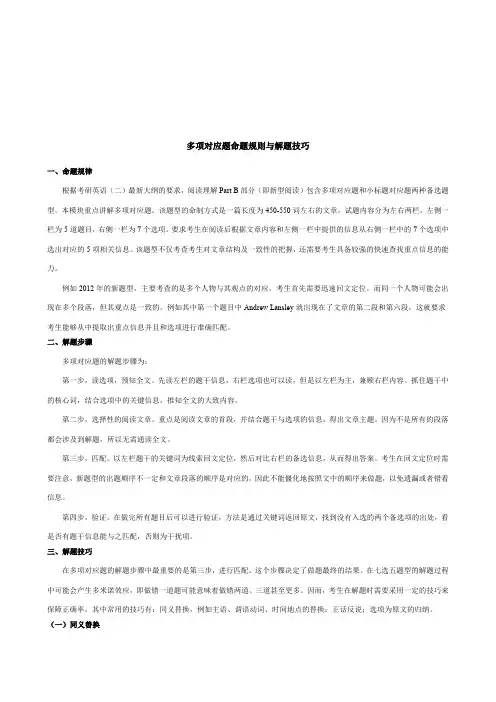
多项对应题命题规则与解题技巧一、命题规律根据考研英语(二)最新大纲的要求,阅读理解Part B部分(即新型阅读)包含多项对应题和小标题对应题两种备选题型。
本模块重点讲解多项对应题。
该题型的命制方式是一篇长度为450-550词左右的文章,试题内容分为左右两栏,左侧一栏为5道题目,右侧一栏为7个选项。
要求考生在阅读后根据文章内容和左侧一栏中提供的信息从右侧一栏中的7个选项中选出对应的5项相关信息。
该题型不仅考查考生对文章结构及一致性的把握,还需要考生具备较强的快速查找重点信息的能力。
例如2012年的新题型,主要考查的是多个人物与其观点的对应。
考生首先需要迅速回文定位。
而同一个人物可能会出现在多个段落,但其观点是一致的。
例如其中第一个题目中Andrew Lansley就出现在了文章的第二段和第六段,这就要求考生能够从中提取出重点信息并且和选项进行准确匹配。
二、解题步骤多项对应题的解题步骤为:第一步,读选项,预知全文。
先读左栏的题干信息,右栏选项也可以读,但是以左栏为主,兼顾右栏内容。
抓住题干中的核心词,结合选项中的关键信息,推知全文的大致内容。
第二步,选择性的阅读文章。
重点是阅读文章的首段,并结合题干与选项的信息,得出文章主题。
因为不是所有的段落都会涉及到解题,所以无需通读全文。
第三步,匹配。
以左栏题干的关键词为线索回文定位,然后对比右栏的备选信息,从而得出答案。
考生在回文定位时需要注意,新题型的出题顺序不一定和文章段落的顺序是对应的,因此不能僵化地按照文中的顺序来做题,以免遗漏或者错看信息。
第四步,验证。
在做完所有题目后可以进行验证,方法是通过关键词返回原文,找到没有入选的两个备选项的出处,看是否有题干信息能与之匹配,否则为干扰项。
三、解题技巧在多项对应题的解题步骤中最重要的是第三步,进行匹配。
这个步骤决定了做题最终的结果。
在七选五题型的解题过程中可能会产生多米诺效应,即做错一道题可能意味着做错两道、三道甚至更多。

考研阅读的基本解题思路:四步走第一,扫描提干,划关键项;第二, 通读全文,抓住中心;1. 通读全文,抓两个重点:①首段中心句、核心概念常在第一段,常在首段出题;②其他各段的段首和段尾句;其他部分略读,有重点的读2. 抓住中心,用一分半时间思考3个问题:①文章叙述的主要内容是什么②文章中有无提到核心概念文章的核心概念是什么一般是反复出现的一个核心词③作者的大致态度是什么是谁对谁的态度第三,仔细审题,返回原文;仔细看题干,把每道题和原文的某处建立联系,挂起钩定位原则:①通常是由题干出发,使用寻找关键词定位原则;关键词:大写字母、地名、时间、数字等②自然段定位原则;出题的顺序与行文的顺序是基本一致的,一般每段对应一题;★要树立定位意识,每一题、每一选项都要回到原文中某一处定位;第四,重叠选项,得出答案;重叠原文=对照原文1. 通过题干返回原文:判断四个选项,抓住选项中的关键词,把选项定位到原文的某处比较,重叠选项,选出答案;2.作题练习要求:要有选一个答案的理由和其余三个不选的理由结论性的句子需要慢读,引用说明的句子需要快读;引用的作用有两点:1;支持自己的观点;2.批评别人论据的论点;十大解题思路:1.细节事实题标志:文章提到具体的时间,地点,人物,问它们具体的关系;五个w,一个h;做题的关键:返回原文题干返回原文:1,根据关键词返回原文2.自然段返回原文;选项返回原文:1,重点词,同义词返回原文2.根据长难句返回原文迷惑选项的设置方式:1偷换概念比如说蒙古人喝牛奶,而选项却说蒙古人喝豆浆2.正反混淆肯定说成否定,反之亦然3,因果倒置4常识判断符合常识的不一定对,但不符合常事的一定不对5扩大范围破车不是车,破车是破车2.例证题标志:illustration 、demonstration、case 、example 、exemplify时做题关键:准确找到例子所支持的观点,而不在于能看懂例子本身做题步骤:返回原文,找到例子出处;然后,从例子出发,80%向上搜索,20%向下,找到该例子支持的观点,在四个选项中寻找与表达的观点最一致,意思最接近的一个;干扰选项的特征:A就事论事;把例子中某一部分内容概括一下放到选项中;特殊例证题,从文章的一个观点出发,来考文章之外的内容,做题关键:要把握观点B混淆论点论据;C列举无关常识;要求:在阅读中,遇到长的例子,立即给这个例子定位,即找出起始点,从哪开始到哪结束;3,词汇题搜索代入法标志:在题目中明确指出原文中某处的单词或词组,要求辨别出意思①返回原文,找出该词汇出现的地方;②确定该词汇的词性③从上下文词汇的前后几句中找到与所给词汇具有相同词性的词如一下子找不到就再往上往下找,代入所给词汇在文章中的位置将之替换看语义是否合适④找出选项中与代替词意思相同或相近的选相,即答案注意:a.如果该词汇是简单词汇,则其字面意思必然不是正确答案;b.考研阅读不是考察字认识不认识,而是考察是否能根据上下文作出正确的判断;c.词汇题的正确答案经常蕴藏在原文该词汇出现的附近;注意不能靠单词词义直接往下推;d.寻找时要注意同位语、特殊标点比如分号,分号前后两句话的逻辑关系不是形式上的并列就是语义上的并列,也就是两句话的意思相同,所以可用其中一句话的意思来推测另一句话的意思从而推出所给词汇含义、定语从句、前后缀,特别要注意寻找时的同性原则;比如:让猜一个名词词组动词词组的意思,我们就向上向下搜索名词词组动词词组;▲ 隐蔽型词汇题:题干与原文的某句完全重合,只有一两个词被替换掉;隐蔽型词汇题的做法跟词汇题的做法几乎一样,往上往下找;4句子理解题标志:在题干中明确指出原文中的一句话,要求理解其意思;①返回原文找到原句;②对原句进行语法和词义的精确分析找主干,应该重点抓原句的字面含义;若该句的字面含义不能确定,则依据上下文进行判断;注意:局部含义是由整体决定的它与词汇提不同,他考得就是它本身的语法和句法的理解,靠的就是本身的含义;③一般来说,选项中的正确答案与原句意思完全相同,只不过用其他英语词汇换种表达而已;④句子理解题的错误选项干扰项特征:推得过远;做题时应把握住推的度;思路:对句子微观分析不行就依据上下文选择时不要推得过远;5指代题常考词:that,it,they①返回原文,找出出题的指代词;②向上搜索,找最近的名词、名词性短语或句子先从最近点开始找,找不到再找次近的,一般答案不会离得太远;③将找到的词、词组或句子的意思代入替换该指代词,看其意思是否通顺;④将找到的词、词组或句子与四个选项进行比较,找出最佳答案;6主旨大意题①主旨题的标志:best title, main idea ,conclusion ,mainly about, mainly discuss②串线法:抓首段和其余各段的第一句话,把其意思连接成一个整体;要注意总结性的提示词和转折词,特别要注意中心句;主要针对自然段少的文章;针对自然段多的文章,主旨题最好联系中心句;找一个和中心句最贴近的③小心首段陷阱;④主旨题错误选项的干扰特征经常是:⑴局部信息,即选项的内容小于文章的内容;⑵范围过宽,即选项的内容大于文章的内容;⑤逆向思维法、快速作文法:在两个选项看上去都十分正确无法选择时,试着从选项出发,想象一下如果自己以此选项来写文章会有那些内容,然后把它与文章的内容比较,接近的即为正确选项;7作者态度题标志:attitude believe concider deem态度分类:1.支持,乐观2.客观,中立3.反对,批评有些选项注定不是选项:indifferent、subjective、biased 、puzzling识别作者态度的方法:1.当作者态度没有明确提出时,找文章中的带有褒贬意或感情色彩的词如:fortunately, excessively, too many.2.根据作者论述的主线方法:把第一段读透,把其他各段的段首段尾句拉出来,看整个文章的谋篇结构及举例的方式来判断;正反都举的话,很可能是客观的;作者态度题的新趋势:1不仅仅局限在作者的态度,也开始问文章某人的态度,做这种题,特别关注题是问的是谁对谁的态度;2选项可能不再是态度明确的态度的词,而改为带有程度限制的词语;比如:reserved;因为带有保留态度的观点比较客观,一般为正确答案;3一般带有绝对化,或过于强烈的词修饰的选项必错;比如strongly completely entirely8判断题标志:which of the following statement is not ture/correct/mentioned或all of the following statements are true/correct except做题思路:先分出是三对一错,还是三错一对;所谓对,是指符合原文,所谓错是指和原文有矛盾,或原文未提及每一个选项都应回归原文,不能通过主观臆断来判断;做判断题时,回到原文是,应注意以下几点:1,转折处2.比较级,最高级出现的句子3,带有褒贬词,感情色彩的词; 9.推理题标志:infer imply learn inform解题关键:绝大多数推理题的答案是原文中心的同意表达,正确答案与原文之间没有推理关系可以通过题干返回原文,或依据选项返回原文,一般要围绕文章中的一两个重点句进行思考,特别注意文章中含义深刻或结构复杂的句子,因为对作者所表达的意思不能一下子看懂的长难句是命题所在;做推理题时,不能想得太多推得太远,看懂文章才是关键;五大微观阅读技巧1.标点符号的作用句号:用来分割句子,以句号为单位,把段分隔成块,逐个击破;团条逗号:在两个逗号中间是一个补充说明成分时,在阅读过程中可以献跳过去不读,重点抓句子的主干;冒号:他前后失宠抽象到具体的过程,后面进一步具体补充说明前面的内容;分号:分号是用来分隔句子的,并列结构:语意上的并列有一种解释说明的作用、结构上的并列比如:对联;破折号:两个破折号之间是补充说明成分,在阅读中可以先不读;如果不能读懂破折号之前的句子的意思可借助破折号间的内容加以理解;引号:引用别人的观点,引用的作用有两点:1;支持自己的观点;2.批评别人论据的论点;引用的目的:不论是正面还是反面引述都是为了说明核心概念、中心思想,否则就没有意义; 括号:它里面的内容分起两种作用:补充说明、解释生词;2.类比关系分为明喻……像……或暗喻……是……,把类比关系看做特殊的例证,找出支持和说明的观点,一定要确认作者把什么比喻做什么3.长难句1、主句,从句多又长,一个主句带多个从句,从句又含从句2、方法:1先抓整句话的主干,从前向后读句子,找出独立的谓语部分,把握复杂句中,最核心的主谓宾语,再根据从句的连接词,区分主从句,层层扩展进行理解;3、分词短语、to do结构,独立主格的干扰注意理解主句最完整的特征就是有完整的主谓结构,尤其是独立的主谓语部分,一个看似句4.一定要掌握的长难句的语法结构A.形式主语或形式宾语出现的句型B.强调句型C.非限定型定语从句D.同位语从句E.倒装结构F.省略句5.虚拟语气1、作者写作时采用虚拟语气,一般表示建议、态度、和观点,用来表达一种反事实的假设;2、阅读时,重点要体会作者利用反话正说,正话反说所传递的言外之意;八大宏观阅读技巧1,一般来讲,考研文章只讲一个主题,中心句往往出项在首段,若首段有转折,中心句可能出现在第二段2,注意把握两类文体,一是议论文,抓作者中心观点和作者的态度;二是说明文,抓说明对象和作者的态度;3,阅读文章时,注意看文章是有几个自然段组成时,还要给文章分层,每一个选项都要力争会原文定位;4,注意考研文章固有的模式:1 花开两朵,各表一枝特点:写作的模式一般是开始提出两个核心概念,随后分段论述;对策:阅读这种类型的文章,关键是要把握两个概念的定义以及它们的区别与联系以及各自特征;2 问题答案型文章特点:该写作模式往往是在第一段出现一个问题,在随后的各段提供该问题的答案;阅读时重点理解该文章的中心,其中心就是该问题的最直接最主要的答案3 时文时效性很强的文章特点:1、耸人听闻,吸引眼球;2、貌似客观,内含态度;3、抛砖引玉,引起争论;一般来说,时文的中心在首段末句,或第二段首句;阅读时文时,把握时文的中心;4 独句段出现一个句子单独成段,特别是其出现在文章开始或者结尾,一般它表达的是文章的中心思想,出现在末尾,是总结全文;若位于文章中间部分一般是承上启下的作用;但少部分出现在中间,也表明中心思想;5 开门见山文章的写作特点是:直接给出观点,摆出事实论据,进行推理论证,注意作者阐述观点的行文结构,每段都紧扣文章的主题;6起承传合型文章特点:首尾呼应,阅读时要抓住论点,区分论点合论据的关系,因为题目设计往往围绕论点进行,并要注意把握文章首尾的前后呼应关系;7 平铺直叙型文章事实和观点交叉出现,在字里行间达到阐明观点的目的,需要大家综合各段内容,通过分析和归纳判断;抓住首段和文章隐含的中心思想8 层层递进型文章特点:段落多,一篇文章的整体,或者几个段落论述的问题,由从抽象到具体,从初级到高级,从简单到复杂的过程,且各段从开始都出现递进词,阅读时注意把握这种文章的中心,或几段的核心;观点必然出现在层层递进各段的最后一段;五层阅读的方法针对真题1 抓住文章的中心大意,和论述的宏观结构;泛读2 认真把握各段大意,争取用1——2个词或者短语概括其意,并把意义相近的段合并成为一个整体;即给文章合为一体3 以自然段为单位,对文章进行更加深入的分析,也就是对单词,词组的背诵记忆以及对长句的精确分析翻译,整文的朗读和背诵;4 佳句摘录,模仿写作;5 换位思考,分析出题人为什么选这样的文章,难度在哪里,论述的结构是什么;并对每一个选项都精确分析,找出正确答案在文中的出处是哪句话;十大错误答案所具备的特征:1.无中生有,原文未提及的概念2.正反混淆3.所答非所问,选项符合原文,但不符合题干的要求4过分绝对比如no+名词5扩大范围,特别注意隐蔽的扩大范围6因果倒置7常识判断,8推得过远,要把握选项的度9偏离中心abc项是符合原文细节信息,而d是原文信息,让你选择概括全文的选项,该选d项,你却选a10变换词性正确答案五大特征:1 正确答案通常与文章中心思想,主旨大意有关;2 正确答案所在位置1首段段尾句2转折处3因果关系处4条件关系处3 正确答案设置的特点:往往利用同义词的替换,或者正话反说,反话正说;4 正确答案从语义上去理解,经常含有不肯定的语气词和委婉表达的词:can 、may、might、possible、some尤其是推理题的答案常这样设置,以显示推理题所论述含义的相对性;5 正确答案具有概括性,深刻性,因为其考查的对象是阅读文章的重点和要点;正确答案应用的原则:1.同义替换2. 正话反说3. 正确答案一般含有不肯定的语气词或委婉表达的用词比如can may possible might some四大金刚法则1、答案在相近之间,答案在相反之间,2:1:1原则2、当两个选项所表达的意思所传递的概念非常接近时,要把握其程度上的差异3、正确答案所在的选项通常不会照抄原文,经常采用正话反说,反话正说的方式,或原文信息的同意改写;4、选项中使用的词越多,这个选项对的可能性越小遇到难的单词时:不认识时怎么办遇到难的单词时,要分别处理,如果影响到文章的理解,根据上下文进行判断,不影响整体理解时,可直接跳过,最重要是相信自己能读懂;关键的句子读不懂时怎么办1 关键的句子读不懂时,从结构的角度,进行缩句,找出独立的谓语动词,再层层扩展,进一步理解含义,可以帮助理解句子的主干;2 找不到谓语动词时,可以借助上下文的逻辑关系,对这句话的意思进行猜测;遇到文章完全看不懂时:1 遇到难的文章时,通读首段的第一句话,尾段的第一句话;看是否能把握住前后呼应的关系,猜测这篇文章的大意;2 与此同时,快速浏览全文,充分的做记号;记号点:显示文章结构的信息词:but、even、althought、for example、if ;显示作者态度的,具有感情色彩的词;Scanning读法注意事项:认真通读首段,快速浏览段落的主题句或结论句,具体细节跳过不读,应该特别注意通过对比转折,因果总结等连接词把握文章的结构,查读的目的是把握作者的态度和文章的中心,所以可以忽略掉例子的内容,具体的数字,引用的内容,以及冒号后面补充说明成分;阅读中需要特别注意并做记号的有:①标志类、指示类的信息;a.表示并列关系: and;also;coupled with等b.表示转折关系: but;yet;however;by contrast;although;in contrast与之形成对照的是等c.表示因果关系: therefor;thereby;consequently;as a result;thus, consequence等d.表示递进关系: in addition to;even;what'more;further more等e.表示重要性的词: prime首要的;above all最重要的;first等f.解释词:namely即,也就是;likewise同样的;in other word换句话说;that is to say那就是说……以上关键词有助于我们对文章逻辑结构的把握②具有感情色彩显示作者态度的词:blind盲目的贬excessively过分的贬考研阅读最基本的复习方法:共有3个key word: ①细读close reading②阅读三步走③ 48精读击破法基本的学习方法:精读和泛读相结合;精读与泛读的比例1:1第一,精读:“48精读击破法”复习方式:以点代面;切忌题海战术精读吃透94-04年的真题文章;1. 精读的角度:①词汇;把文章中的单词要背会、要全部熟悉掌握;②对阅读中的长句、难句进行分析;每篇文章中摘出5—10个长难句背诵,翻译;③解题思路;要对题目进行分析——解题思路的分析、错误分析;对题目中的四个选项要做分析,正确的选项要做分析,错误的选项也要做分析;2.对48篇真题精读:①首先,分析文章,对题目中的四个选项要做分析;正确的选项要做分析,错误的选项也要做分析;其次,把文章中的单词要背会,要全部熟练掌握;长难句要摘取下来背诵、翻译;②重点文章,有时需要背诵全文;③对于文章则可以多角度的读,题目也可以多角度的分析;3. 五层递进的方法精读48篇文章:①抓住文章的中心;考研文章特重视抓住中心意思的能力; 中心思想+ 细节= 文章;要反复把自己以前的思路同现在的思路作对比,才可以提高自己把握中心的能力;②抓各个自然段的大意;争取用一两个词或词组概括整个自然段的大意,并且把意思相近的自然段合为一体,即给文章分层;③以自然段为单位,对文章进行深入剖析;即对单词、词组的记忆和对长句的精确分析、背诵;④佳句摘录;⑤换位思考层;即考研专家为什么选这样的文章,选此文章的难度在那里,文章的谋篇结构事什么;可以与考研专家换位思考,还可以与作者换位;与作者换位:如果我是文章作者的话,在大约相同字数的条件下,要描述同一件事情,我会如何展开文章,然后同作者的思路做比较;4. 精读达到的基本要求:①所有的单词都背过;②从文章中任何地方拿出一句话,都应该搞清楚,能分析出语法结构;③从文章中摘出来任何一个指代词,就马上可以知道它的指代关系;5.背单词:①集中力量大面积的过单词认知,用大纲就可以了②以真题为范本,搞清这些词在句中的深刻含义;大纲提到:一篇文章中生词的出现率应该小于等于3%;要注意模拟题的选择;第二,泛读:1. 泛读练习的目的:①增强背景知识;②锻炼抓住文章中心的能力;2. 建议:①每周一次China Daily,时效性强,多注意经济文化、科技、观点类文章;②每月至少看一本英文杂志:Time,News week,Economist,英语世界,优秀时文阅读③勤上网浏览相关英文新闻;推荐英文网站:要求泛读新概念第四册,每天泛读一篇,多遍泛读;⑤推荐两本辞典:朗文或牛津高级双解辞典、韦氏大学辞典模拟题:一周4篇;精细地研究真题其他总结1. 阅读的启示:①短文中的一些难以理解的句子有时并不会对理解全篇产生很大的障碍;②把握文章结构,抓住文章的核心概念;③踏踏实实地提高自己的阅读水平70%,并且要掌握一定的阅读方法和技巧30%;要能够分辨哪些信息要读哪些信息不读;④考试阅读的最高目的:做题;阅读理解的重要原则:模糊中求准确;2. 做题的启示:①排除了两项之后,要选择与文章中心相关的一项;②四个选项中有两项意思相反时,其中必有一个是答案;③虽然是一道细节题,但也可以当成一道主旨题来做;④类比、比喻、列举、举例的目的都是为了说明中心;3. 考研的文章与四六级文章的重要不同之处:前者重细读,后者重速度;考研的文章重视考察抓住中心思想的能力;中心思想+ 细节= 文章;中心思想引领细节;要反复把自己以前的思路同现在的新思路作对比,才可以提高把握中心的能力;4. 关于九堂课的阅读方法:微观和宏观把握文章的结构怎么把握,它的脉络;掌握句子怎么去理解它的含义;另外,还有八大题型的总结;5. 常见问题:做题技巧用不上怎么办能够不由自主地按照正确的思路解题了,才表明我们正确掌握了这些技巧;在课堂听明白之后,还需要回去自己思考,针对自己的实际分析分析6. 关于复习的安排:先把上课讲完的文章趁热打铁,把文章固化下来;每天搞透一篇,然后把剩下的文章每天做一篇,做完了之后再精读;七月份开始,看文章同时应该做一些新题,做新题时要带点实战的感觉,即抽出80分钟时间做一套题;在时间较多的暑假中,一周两套题就可以了;到9、10月份每周保持做一套题就可以了;11、12月份时,停止做模拟题;把90、91、92、93年的考研真题做一下,并精读;48篇最少要轮到七八遍;考研阅读的时间分配问题:1. 4篇75—80分钟,平均每篇15—20分钟;2. 读文章的时间分配:用6—8分钟完成第一遍阅读,10—14分钟来琢磨题目,每题平均2分钟;读文章时需特别留意的细节:①举例、打比喻处②人物论段③转折处后④复杂句⑤因果句⑥特殊标点⑦段首段尾句最常出题的地方是:中心思想或核心概念;中心思想+ 细节= 文章。
Synonyms for Reading♦1.severe—harsh--strict♦2.dwelling—housing—residence--inhabit♦3.obstacle—barrier—hindrance—obstruction—difficulty—hardship—adversity♦4.contain—include—incorporate—consist—involve♦5.facilitate—help—smooth—simplify♦6.harvest—gather—gain—obtain--capture♦7.previous—earlier—prior—former♦8.specific—detailed—actual—concrete--particular♦9.ultimate—eventual—essential♦10.enhance—improve—promote—boost—stengthen♦11.ability—capability—capacity—competence♦12. able—capable—competent—adept--proficient♦13.category—class—sort—type—classification♦14.recruitment—employment—staffing—interview--enlistment♦15. comprehension—understanding—conception—grasp♦16.characteristic—trait—feature♦17.resolve—solve—settle—figure out—deal with—handle—dispose—manage—tackle ♦18.enforce—implement—administer—carry out—execute♦19.criterion—standard—benchmark♦20.available—accessible—on hand—obtainable♦21.accept—welcome—embrace—adopt—support♦22.sponsor—support—back—subsidize—fund♦24.initially—at first—originally—firstly--uppermost♦25.prejudice—bias—partiality—preference♦26.inequality—discrimination—unfairness—inferiority♦27.change—transform—alter—shift—switch♦28.spectacular—impressive—magnificent—marvelous—breathtaking—fantastic—terrifi c-gorgeous♦29.highlight—emphasize—focus on—attach importance—underline--value♦30. diversity—variety—multiplicity♦31. different—diverse—diversified—various—multiple♦32.contrary—opposite—adverse—reverse—contrasting♦33.generate—produce—create—engender—give birth to--yield♦34.choice—option—alternative♦35.undertake—assume—carry out—commence—launch♦36. method--way—approach—channel—means—technique♦37. area—field—domain—territory—sphere♦38. Prime,chief, primary, principal, major♦39.fundamental—basic—primary—elementary♦40.collegue—coworker—associate—teammate—collaborator♦41.victory—triumph—accomplishment--achievement—success♦42.outlet—market—retailer—agent-chain—channel♦43. Different—differ—distinct--distinguish♦44.surpass—exceed—excess—outweigh♦45. forsake—abandon—throw away—discard--desert♦47.pridict—foresee—forecast—prefigure♦48. eruption—outbreak—outburst—explosion—emission♦49.predominate—dominate—dominant—leading—overwhelming ♦position—constitution—makeup—component♦51.respectively—individually—seperately—singly♦52.migration—immigration—movement—relocation—resettlement ♦53. chaos—disorder—confusion—panic--mess♦54.random—aimless—casual♦55.crucial—vital—critical—key—essential♦56.hazard—danger—risk—threat—menace♦57.eliminate—fade—disappear—vanish – extinct♦58. defect—weakness—shortcoming--flaw♦59.merit—virtue—excellency--strength♦60..prevalent—popular—prevailing—predominant◆61. abolish, cancel, repeal,abandon◆62. absorb, suck, digest, incorporate◆63. abundant, plentiful, ample,sufficient◆64. Rival, competitor, opponent, adversary, contender♦65. acknowledge, admit, confess, recognize, concede♦66.active, energetic, vigorous, brisk, lively♦67. adapt, adjust, conform, accommodate, suit, fit♦68. addition, appendix, attachment, supplement, accessory♦69. age, epoch, era, period, times♦71. agree, accord, coincide, conform, correspond♦72. aim, goal, purpose, end, target, object, objective♦73. alike, like, similar, comparable, parallel, uniform, identical♦74.amuse, entertain, interest, please♦75. anger, indignation, fury, rage, wrath♦76. announce, declare, proclaim, pronounce, advertise, broadcast, publish♦77. apparatus, instrument, device, equipment, tool, implement, installation, appliance, facilities♦78. appoint, designate, assign, name, nominate♦79. artificial, false, synthetic, man-made♦80. assert, affirm, allege, maintain, testify, claim♦81. assign, distribute, divide, allocate♦82. attempt, try, endeavour, strive♦83. ancient, old, antique, prehistoric♦84. attract, charm, enchant, fascinate, tempt,induce,seduce♦85. Decrease, decline, fall, drop, descend,go down,decay♦86. Increase, rise, soar, ascend, climb, mount up, go up♦87. attitude, air, manner♦88. assume, presume, suppose, guess。
考研写作100个同义词替换精髓词汇1.important=crucial=significant=vital=essential=critical=fatal=concernful=necessarymon=universal=ubiquitous[juː'bɪkwɪtəs] =general=[widely adv]3.abundant=ample(enough and usually extra), plentiful(enough for people's needs andwants) =sufficient4.stick=adhere=cling(hold on something tightly) =insist=persist5.neglect=ignore=overlook=elide [ɪ'laɪd] =lose sight of sth.(difference: neglect meanssomeone has not paid enough attention to something; ignore means noattention.)6.near=adjacent [ə'dʒeɪs(ə)nt](two things next to each other)=adjoin [ə'dʒɒɪn](thesame as adjacent) =close to7.pursue=woo(man woos woman, old-fashioned), seek(if you seek sth, you try toobtain it.) =chase=aspire8.accurate=precise(precise is exact and accurate in all details), exact(correct in everydetail)9.vague=obscure=dim=indistinct=fuzzy10.top=peak=summit=acme ['ækmɪ]petitor[kəm'petɪtə]=rival=opponent(especially in sports and politics)12.blame=condemn(if you condemn something, you say it is very bad and unacceptable) =make illegal=abuse=censure['senʃə]=denounce=curse=imprecate ['ɪmprɪkeɪt] vt. 诅咒;祈求13.opinion=perspective=standpoint=idea=viewpoint=point of view Noun14.fame=prestige[pre'stiː(d)ʒ]威望,声望;声誉(describe those who are admired), reputation=distinction n. 区别;差别;特性;荣誉、勋章15.build=erect=establish=found16.insult=humiliate(do something or say something which makes people feel ashamed or stupid) =put sb. to shame =eat humble pie自己的不好的作为自取其辱plain=grumble (complain something in a bad-tempered way) =murmur at18.primary=radical (very important and great in degree), fundamental19.relieve=alleviate (alleviate means you make pain or sufferings less intense orsevere) =lighten=ease=remit20.force=coerces [ko'ɝs] into(coerce means you make someone do something he doesnot want to), compel=enforce=impel21.enlarge=magnify(magnify means make something larger than it really is) =expansion=amplify=broadenplex=intricate(if something is intricate, it often has many small parts and details ) =complicated=sophisticated23. lonely=solitary=lonesome=single24.small=minuscule ['mɪnəskjuːl] (very small), minute,25.praise=extol[ɪk'stəʊl;(stronger than praise), compliment=commend26.hard-working=industry N=assiduous[ə'sɪdjʊəs](someone who is assiduousworks hard or does things very thoroughly)27.difficult=tough=[V摩擦,碰撞bump=rub]=arduous (if something is arduous, it isdifficult and tiring, and involves a lot of efforts)28.poor(soil)=barren=infertile(used to describe the soil is so poor that plants cannotbe planted on it)29.fragile=brittle['brɪt(ə)l]=vulnerable(someone who is vulnerable is easily hurtemotionally or physically)30.show=demonstrate=illustrate=prove=indicate=discover=find(to demonstrate a factmeans to make it clear to people.)31.big=massive(large in size, quantity, or extent)=colossal [kə'lɒs(ə)l] (use this word, youemphasize something‟s large), tremendous=giant=huge=enormous=gigantic32.avoid=shun=escape=prevent=hide from33.fair=impartial=just=equitable=detached34.attack=assault (physically attack someone), assail [ə'seɪl] (attack violently)=offend35.dislike=abhor(abhor means you hate something to a extreme extent for moralreasons), loathe(dislike very much)disagreeable=disgusting=hate36.ruin=damage=break=devastate ['devəsteɪt] =destroy=wreck=decay=ravage ['rævɪdʒ]37.rare=infrequent (doesn‟t happen often)38.greedy=rapacious [rə'peɪʃəs] (greedy and selfish)39.always=invariably=often=usually= frequently40.forever=perpetual(a perpetual state never changes), immutable(somethingimmutable will never change or be changed)41.surprise=startle(it means surprise you slightly), astound(surprise you to a largedegree), astonish(the same as astound)42.enthusiasm=zeal(a great enthusiasm),fervency ['fɜːvənsɪ](sincere andenthusiasm) [ɪn'θuzɪæzəm]43.quiet=tranquil(calm and peaceful), serene [sə'rin](calm and quiet)=silent=calm44.expensive=high price=can‟t be affordable=exorbitant[ɪg'zɔːbɪt(ə)nt](it means tooexpensive that it should be)45.luxurious=lavish(impressive and very expensive), sumptuous['sʌm(p)tjʊəs](grand and very expensive)46.boring=tedious(if you describe something tedious, you mean it is boringand frustrating) =senseless adj. 愚蠢的;无知觉的;无意识的=uninteresting=disappointe47.respect=esteem[ɪ'stiːm; N=honor48.worry=fret V/N=apprehensive [æprɪ'hensɪv]ADJ (if you fret about something, youworry about it)49.cold=chilly(unpleasantly cold), icy(extremely cold)=freeze50.hot=boiling(very hot)51.dangerous=perilous(very dangerous, hazardous(dangerous, especially to people'ssafety and health)52.nowadays=currently53.only=unique(the only one of its kind), distinctive;54.stop=cease(if something ceases, it stops happening or existing)55.part=component [kəm'pəʊnənt] (the components of something are the parts that itis made of)56.result=consequence(the results or effects of something)57.obvious=apparent, manifest [can see or notice them very easily)58.based on=derived from60.quite=fairly ADV61.pathetic=lamentable ['læməntəb(ə)l](very uncomfortable and disappointing)62.field=domain(a particular field of thought, activities or interest)63.appear=emerge(come into existence)64.whole=entire(the whole of something)65.wet=moist(slightly wet), damp(slightly wet), humid(very damp and hot)!66.wrong=erroneous(incorrect or partly correct)67.difficult=formidable68.change=convert(change into another form)69.typical=quintessential[,kwɪntɪ'senʃ(ə)l](this word means represent a typical example of something)70.careful=cautious(very careful in order to avoid danger), prudent(careful and sensible)71.ability=capacity, capability(the same as ability)72.strange=eccentric(if some one is eccentric, s/he behaves in a strange way, orhis/her opinion is different from most people)73.rich=affluent(if you are affluent, you have a lot of money)e= utilize (the same as use)75.dubious=skeptical(if you are skeptical about something, you have doubts on it.)76.satisfy=gratify (if you are gratified by something, it gives you pleasure andsatisfaction)77.short=fleeting, ephemeral[ɪ'fem(ə)r(ə)l(if something is ephemeral, it lasts a short time)78.scholarship=fellowship79.angry=enraged(extremely angry)80.smelly=malodorous[mæl'əʊd(ə)rəs] (used to describe an unpleasant smell)81.ugly=hideous ['hɪdɪəs] (if something is hideous, it is very ugly or unattractive)#82.attractive=appealing(pleasing and attractive), absorbing(something absorbing canattract you a great deal)83.diverse=miscellaneous[,mɪsə'leɪnɪəs](a miscellaneous groups consists of many different kinds of things)84.disorder=disarray [dɪsə'reɪ], chaos85.crazily=frantically(used to describe someone who behaves in a wild and uncontrolled way)86.rapid=meteoric[,miːtɪ'ɒrɪk](ATTENTION: meteoric is only used to describesomeone achieves success quickly)87.ordinary=mundane(very ordinary and not at interesting or unusual)88.despite=notwithstanding [nɒtwɪð'stændɪŋ (FORMAL)89.best=optimal(used to describe the best level something can achieve)/90.sharp=acute(severe and intense)91.unbelievable=inconceivable(if you deem something inconceivable, you think it very unlike to happen92.puzzle=perplex(something perplex someone means it confuses and worries him/her because he/she does not understand it)93.method=avenue(away of getting something done)94.famous=distinguished(used to describe people who are successful in their career)95.ancient=archaic[ɑː'keɪɪk] (extremely old and extremely old-fashioned)96.decorate=embellish[ɪm'belɪʃ(embellish means make something look moreattractive via decorating it with something else)97.possible=feasible (if something is feasible, it can be done, made or achieved)98.so=consequently, accordingly99.rare=infrequently(doesn…t happen often)100Greedy=rapacious [rə'peɪʃəs](greedy and selfish)1.重要的:Key, crucial, critical, important, significant, vital, substantial, indispensable, imperative [ɪm'perətɪv]必要的,不可避免的;紧急的;命令的,专横的;势在必行的;[语]祈使的2.损害Damage, hurt, injure,['ɪndʒə]harm, impair, undermine[ʌndə'maɪn], jeopardize ['dʒepədaɪz]3.给与:Give, offer, render vt.致使;提出;实施;着色;以…回报, impart [ɪm'pɑːt], provide, supply, afford4.培养::Develop, cultivate, foster ['fɒstə]5.优势:Advantage, merit, virtue ['vɝtʃʊ], benefi t, upside ['ʌpsaɪd], strength6.缺陷:Disadvantage, demerit[diː'merɪt], drawback, downside, weakness7.使迷惑:Puzzle, bewilder, perplex [pə'pleks], baffle['bæf(ə)l]8.解决: Solve, deal with, cope with, handle, resolve vt. 决定;溶解;使…分解;决心要做…, address, tackle9.认为:Think, believe, insist, maintain, assert, conclude, deem, hold, argue, be convinced相信,确信, be firmly convinced坚信, be fully convinced be deeply convinced深信10.保护:Protect, conserve [kən'sɜːv], preserve[prɪ'zɜːv]11.确保:Assure, ensure, guarantee, pledge [pledʒ]保证,许诺;用…抵押;举杯祝……健康12.有害的:Bad, baneful evil, harmful, detrimental[,detrɪ'ment(ə)l]13.要求:Request, demand, needs, requisition [,rekwɪ'zɪʃ(ə)n]vt. 征用;申请领取14.消除:Eliminate, clear, remove, clear up, take away, smooth away15.导致Lead to, bring about, result in, cause, spark of f, conduce to有助于;导致, procure[prə'kjʊə], induce, generate16.因此:So, therefore, thus, hence, consequently, as a consequence, accordingly, as a result, because of this, (And) as a result of this这样做导致的结果就是17.增长至:Grow to,rise to,increase to,go up to,climb to,ascend to,jump to,shoot to18.降低至:Dip to,fall to,decline to,decrease to,drop to,go down to,reduce to,slump to,descend to,sink to,slide to19.保持稳定:Level out,do not change,remain stable,remain still,remain steady,be stable,maintain the same level,remain unchanged,be still,remain the same level,stay constant,keep at the same level,level off,stabilize,keep its stability,even out20.急剧地:Dramatically,drastically,sharply,hugely,enormously,steeply,substantially,considerably,significantly,markedly,surprisingly,strikingly,radically,remarkably,vastly,noticeably21.平稳地:Steadily,smoothly,slightly,slowly,marginally ['mɑːdʒɪn(ə)lɪ],gradually,moderately ['mɑdərətli],mildly22.宣称:Allege[ə'ledʒ], assert, declare, claim23.发生:Happen, occur, take place24.原因:Reason, factor, cause25.发展:Development, advance, progress26.有益的:Useful, helpful, beneficial, profitable, rewarding,advantageous[ædvən'teɪdʒəs]27.影响:Influence, impact, effect28.明显的:Clear, obvious, evident, self-evident, manifest, apparent, crystal-clear29.占:Comprise, take up, account for, constitute, consist of, make up, occupy, hold, compose30.与…相比:Compared with,compared to,in comparison with,in comparison to,by comparison with,by comparison to31.对比而言:By contrast,in contrast,on the other hand,on the contrary=,conversely32.展示:Show, reveal, illustrate, demonstrate, depict, present, represent, describe33.大约:Approximately,almost,about,around,nearly,roughly34.换言之:Namely,that is to say,in other words,to put it like this,to put it differently,to put it from another way,to put it from another angle.35.事实上:Practically,in practice,essentially,in essence,in reality,in effect,in fact,as a matter of fact,it is a fact that37.琐碎的,不重要的,微不足道的—superficial ,trifling38.轻蔑, 嘲笑contempt[kən'tem(p)t], derogate ['derəgeɪt],disparage[dɪ'spærɪdʒ]39.反对,不赞成--demur [dɪ'mɜː]deprecate ['deprɪkeɪt] dissent [dɪ'sent] dissident ['dɪsɪd(ə)nt]40.否认,拒绝,驳斥-- contradict [kɒntrə'dɪkt]dispute dɪ'spjuːt refute[rɪ'fjuːt]41.促进,帮助—accelerate, advance, facilitate, hasten ['heɪs(ə)n] ,hurry , promote42.迅速发展—prosper, flourish, thrive, boom, develop, grow, increase, mushroom , sprout[spraʊt] vi. 发芽;长芽vt. 使发芽;使萌芽43.减弱,降低—clam[klæm], appease [ə'piːz], allay [ə'leɪ], alleviate, ease, lessen ['les(ə)n] ,moderate44.吸引人的—intriguing ['ɪntriːgɪŋ, alluring[ə'l(j)ʊərɪŋ] ,appealing ,attractive ,bewitching ,captivate ['kæptɪveɪt], charming ,enchanting ,enticing [ɪn'taɪsɪŋ ,fascinating36.波动:Fluctuate,go ups and downs,display a fluctuation,demonstrate a fluctuation英语写作中高级同义词替换连词篇:(介词,副词)Firstly: previously, beforehand, foremost, initially, originally, formerly, principally, mainly, essentially, basically, generally, commonly, universally, on the whole, fundamentally, to begin with, to start with, first of all, at the outset…Then: subsequently, afterward, thereafter, after that, secondarily, what is more, furthermore (further more)…Lastly: ultimately, eventually, in conclusion, to conclude, as a final point, last of all, last but not least, finally…Too: as well (句末)也, in addition, besides, moreover, additionally, to boot, excessively [ɪk'sɛsɪvli], also…And: plus, as well as, along with, in addition, bonus ['bəʊnəs], with…Or: otherwise, if not, , or else…So (adv): therefore, thus, consequently, accordingly, as a result, for that reason, hence, that‟s whyBecause: as, due to, since, as to至于,关于;就……而论, in that, for the reason that, for, now that…But:however, moreover, nevertheless, nonetheless, on the contrary, on the other hand, 让步although, even thought, though, even if, while, as, despite the fact that…Only: just, merely, barely, singly, solely, rarely…Without: excluding, [ɪk'skluːdɪŋ]Very: extremely, acutely, decidedly, deeply, exceedingly, greatly, highly, uncommonly, profoundly, unusually…Actually: as a matter of fact, indeed, in fact, in point of fact, in reality, in truth, literally, truly …形容词/副词Important: essential, significant, vital, crucial, profound, play a pushing role, indispensable, requisite, critical, fundamental, primary, elementary, underlying, rudimentary, basically, necessary…-附加-傻句替换:I think that A is more important than B. (这是经典大傻句!以下句中的'important'可随意替换同义词)1. A is important to B.2. A plays an/a important role to B.3. A is of (great\enormous\significant\awesome) to B.4. B can not (live\developed\grow\survive\achieve) without A.5. A means (a lot\a great deal\much) to B.6. The importance of A (to B) can never be (exaggerated\denied\ignored\doubted).7. A is everything/the whole world to B.8. B is fundamental on A.9. A matters/counts to B.10. Nothing is more crucial to B than A.11. A is to B what the (foundation is to a skyscraper\water is to fish\the heart is to a human)Big: gigantic, massive, colossal, enormous, immense, gargantuan [gɑː'gæntjʊən], tremendous, titanic, giant, vast, large, huge, monster, bulky,->many: numerous, myriad ['mɪrɪəd], infinite ['ɪnfɪnət],->forever (adv): infinity [ɪn'fɪnɪtɪ], eternal, timeless, everlasting,undying, endless, changeless, perpetually…Small: minimum, diminutive [dɪ'mɪnjʊtɪv], minute, petite [pə'tiːt], wee, undersized, teeny['tiːnɪ], tiny, little, petite(女子身高娇小)Good: marvelous, fabulous, gorgeous, spectacular [spek'tækjʊlə], outstanding, distinguished, remarkable, superb[suː'pɜːb, incredible, unbelievable, out of this world, magnificent, charming, stunning, fantastic, terrific, excellent, great, wonderful, amazing, awesomeBad: awful, terrible, dreadful, defective, faulty, imperfect, inadequate, poor, substandard, unsatisfactory, harmful, damaging, deleterious [,delɪ'tɪərɪəs], detrimental[,detrɪ'ment(ə)l], hurtful, ruinous, unhealthy, evil, immoral…Clever: brilliant, knowledgeable, intellectual, intelligent, excellent, bright, smartHappy: delightful, delectable [dɪ'lektəb(ə)l], elated [ɪ'leɪtɪd], glad, overjoyed, pleased, jubilant['dʒubɪlənt], merry, joyful,Beautiful: charming, charismatic[kærɪz'mætɪk], attractive, gorgeous, pretty,endearing, sweet, adorable, eye-catching, handsome, hot, cute, good-looking, lovable, engaging…Fast:swift, quick, rapid, speedy, hasty, nippy['nɪpɪ], like lightning,来源:(/s/blog_6027a7830100gd99.html) - 英语写作中高级同义词替换_+hurry (v): hustle, rush, make haste, tear, step on it, dash, get a move on, step on it, scoot[skuːt].Easy: simple, effortless, no trouble, painless, plain sailing, uncomplicated,undemanding, unproblematic, a piece of cake (in formal), child‟s play (informal),…Clear: obvious, apparent, blatant ['bleɪt(ə)nt], comprehensible,conspicuous[kən'spɪkjʊəs], distinct, evident, manifest, palpable ['pælpəb(ə)l], plain, pronounced, recognizable, transparent, intelligible, lucid['luːsɪd], plain,understandable, uninvolved, simple, …Direct: bald [bɔːld], basic, frank, naked, plain, sincere, stark完全的;荒凉的;刻板的;光秃秃的;朴实的, straightforward, candid['kændɪd adj. 公正的;坦白的;率直的;偷拍的], forthright ['fɔːθraɪt直率的;直截了当的, outspoken坦率的,直言不讳的….Difficult: hard, tricky, complicated, complex, intricate, involved, knotty ['nɒtɪ],perplexing, puzzling, thorny…Angry: annoyed, cross, displeased, enraged, exasperated, incensed, infuriated, irate, mad (informal), livid (informal), berserk[bə'zɜːk, outraged, resentful...Dangerous: perilous, breakneck, chancy (informal), hazardous, insecure, precarious [prɪ'keərɪəs], risky, unsafe, vulnerable动词Think (that): hold the (opinion/ belief/ position/stand point/idea) that, assume, believe, deem, reckon, argue, maintain, suppose, conceive, insist, be convinced, to myknowledge, personally, from my personal perspective, as far as I am concerned, from my point of view, from my angle, consider, conceive, perspective...Show:convey, reveal, express, corroborate [kə'rɒbəreɪt], justify, imply, verify,clarify, signify, exemplify, illuminate, substantiate, demonstrate, elucidate[ɪ'l(j)uːsɪdeɪt], denote, characterized as, instruct, display, disclose, indicate, means, explain, give an/a example (reason, explanation) of, bear out, point out, pointtoward…Know: realize, comprehend, identify, distinguish, discern [dɪ'sɜːn], notice, perceive, recognize, see, understand, figure out, be acquainted with, be familiar with,Get:acquire, attain, acquire, achieve, obtain, gain “学习” 不用learnSuggest: have a proposal in,Increase: magnify, expand, proliferate, mushroom, improve, enhance, advance…Impress: affect, inspire, engrave on, imprint of,∙Influence: impact, affect, guide, sway, vt. 影响;统治;使摇动∙vi. 影响;摇摆∙n. 影响;摇摆;统治Stop: halt, cease, conclude, desist dɪ'sɪst], end, pause, put an end to, quit,refrain[rɪ'freɪn] vi. 节制,克制;避免;制止, shut down, terminate…Mak e: create, assemble, built, construct, form, manufacture; fore, cause, compel,constrain vt. 驱使;强迫;束缚, drive, impel, induce, oblige, prevail, upon, require…Give: present, award, contribute, deliver, donate, grant, hand over, hand out, provide, supplyBreak:separate, burst, crack, destroy, disintegrate英[dɪs'ɪntɪgreɪt] vt. 使分解;使碎裂;使崩溃;使衰变vi. 瓦解;碎裂;衰变, fracture, fragment, shatter, smash, snapDestroy: ruin, raze vt. 夷为平地;破坏;消除;拆毁, annihilate[ə'naɪɪleɪt], crush, demolish [dɪ'mɒlɪʃ], devastate, eradicate, shatter, wipe out, wreck, obliterate [ə'blɪtəreɪt], weaken, undermine…Happen: occur, come about, come to pass, develop, result, take place,transpire[træn'spaɪə;名词Problem: issue,question, case, trouble, difficulty, dilemma.Meeting: conference, discussion, assembly, conclave['kɒŋkleɪv] n. 秘密会议;红衣主教团;教皇选举会议, congress, convention, gathering session, assignation, encounter, confro ntation, argument, controversy…Study: learning, application, lessons, reading, research, school work, examination, analysis, consideration, contemplation, [,kɑntəm' pleɪʃ(ə)n]n. 沉思;注视;意图。